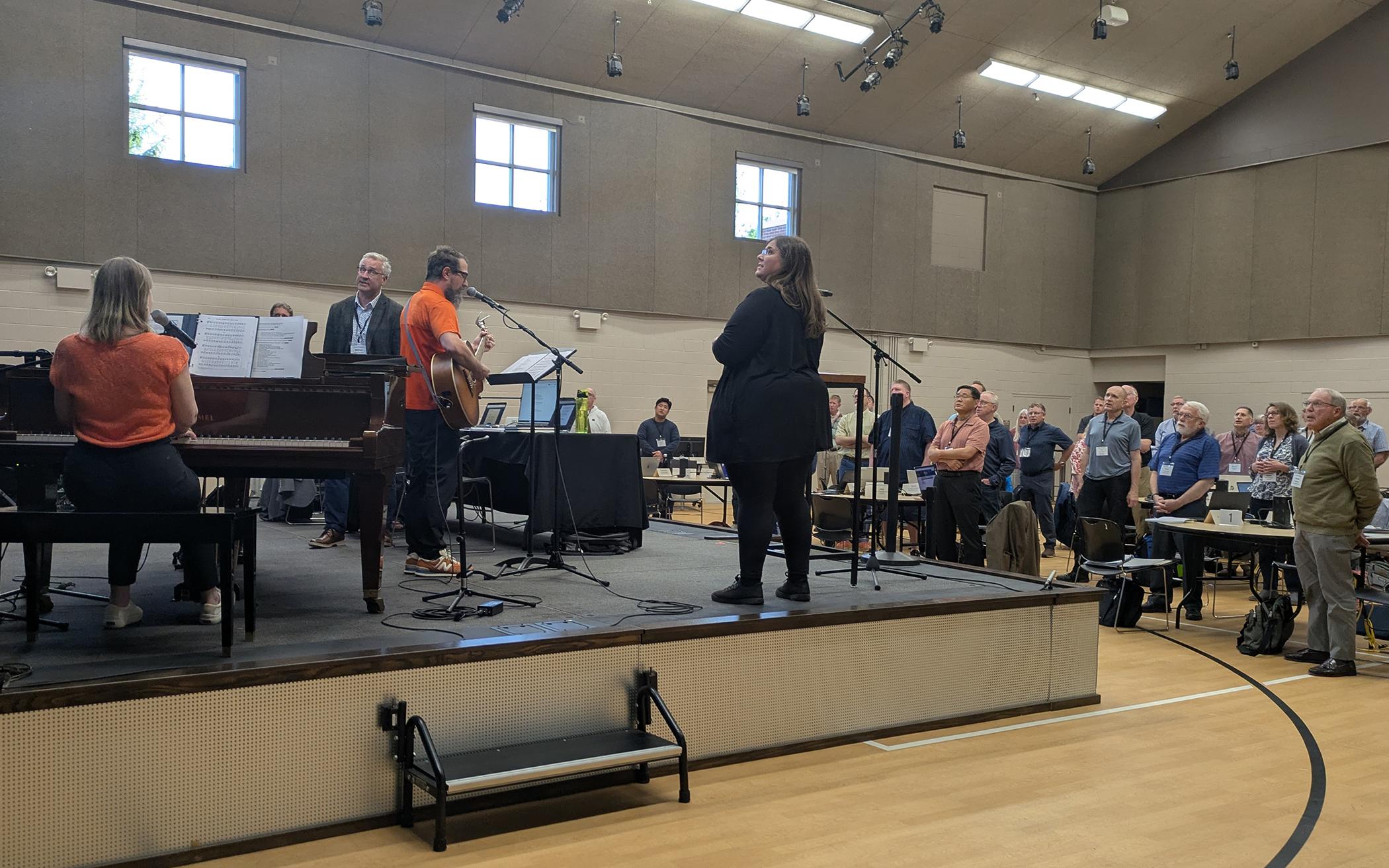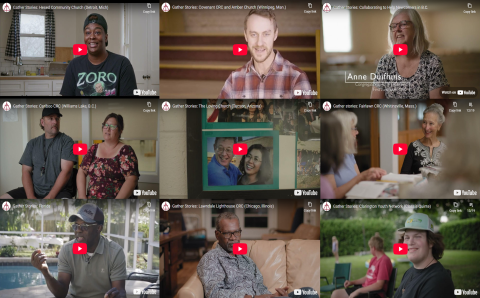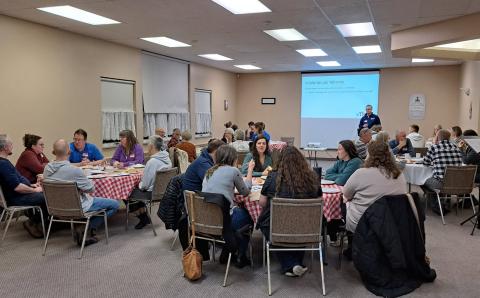When the Council of Delegates of the Christian Reformed Church in North America met May 7 to 9 in Grand Rapids, Mich., delegates toured the new ministry support center, approved an altered personal reservation procedure, thanked six retiring delegates for their service, accepted several things to pass on to Synod 2025, and approved a job description for a director of partnership administration position, to be posted after Synod 2025.
The Council is a 50-plus member ecclesiastical board for the denomination with one delegate from each of the CRCNA’s 49 classes and some at-large delegates, acting as an interim committee for synod, the annual general assembly of the CRC. The new office space at 300 East Beltline Ave. NE in Grand Rapids has been in use since January and will be open for a public dedication ceremony May 22.
The Council of Delegates, meeting at Cascade Fellowship CRC in Grand Rapids, accepted a revised “personal reservations procedure” to replace the exceptions policy previously in force for the Council of Delegates. This was revised from what was presented and discussed at the February meeting and sent back to the executive committee “for further proposed amendments that would align the policy with the work of Synod 2024.” Some delegates were concerned that the reservations procedure still doesn’t fully fit with synod’s guidelines. Lloyd Hemstreet, Classis Zeeland, said that while “I do think this has significant changes that the February policy didn’t, Synod 2024 said three things” about confessional subscription and serving the church: “you can’t come onto a board if you already have an issue (with a confessional teaching of the church); you can’t have an issue and just never resolve it; and a third item that synod said that this policy doesn’t address is, ‘You cannot be delegated to broader assemblies while you have a difficulty in process.’”
Using the understanding that the Council of Delegates as the interim body of synod is akin to an assembly, Hemstreet believed the personal reservations procedure, which allows for a Council of Delegates member who develops a personal reservation about a matter of doctrine while serving to continue to serve their term, is out of step with the synodical guidelines. The majority voted to adopt the procedure with 31 voting yes, 14 no, and one abstention. Hemstreet and three other delegates registered a negative vote.
Diaspora and Ethnic Ministry, Global Vision
The Council of Delegates voted to create an advisory committee for Diaspora and Ethnic Ministry, to advise “about the effectiveness of the CRCNA’s efforts to enfold ethnic minority members and leaders into our denomination’s ecclesiastical governance—synod, classis, council, and Council of Delegates.” The committee, made up of six existing COD members and a slate of up to six invited guests “from among the preceding year’s synodical delegates who represent the diversity of the CRCNA from the United States and Canada” will meet twice during the 2025-2026 ministry year, concluding with an evaluation and proposal to continue or discontinue the committee the following year. It’s a development from earlier listening circles to review how the denomination supports the growing number of congregations and ministries from diverse backgrounds “and network that work together,” said general secretary Zachary King. He noted this “represents more than 25% of our denomination now.”
The Council of Delegates heard that a new position, director of partnership administration, to replace that of chief administrative officer Shirley DeVries when she retires in January, will have a role in supporting that networking group. The Council approved the job description, which will be posted in June until mid-August with hopes to have a candidate to present to the COD in October.
The Council also moved forward on the Global Vision Implementation Team, a group proposed in a COD report to synod in 2024. Made up of King; one other staff adviser; and seven pastors, retired missionaries, and church planters from varying backgrounds, the team’s first focus is to make an inventory of resources for CRCNA churches and classes considering affiliations from worldwide churches. A formal report of the progress of the team will be presented in the October 2025 meeting of the COD.
Cost Review
The Council used 30 minutes of its plenary time to discuss and evaluate possible scenarios presented by the task force to Reduce and Fund Governance, established in February to address the reality that paying for governance operations of the denomination is taking up a greater and greater percentage of ministry share revenue as the overall amount contributed by the CRC’s member congregations decreases. The task force’s final report will come to the Council of Delegates’ October meeting.
Synod 2025
The Council adopted three communications to add to the supplement to the Agenda for Synod 2025, by way of the right of comment on material already in the agenda, if a ministry or agency believes it has helpful information for synod to consider on the matter.
Delegates considered and adopted a comment from Kevin DeRaaf, director of Resonate Global Mission; comments regarding proposed synodical advisory committee to interview candidates for denominational boards (Overture 7); and comments from the Banner advisory committee related to requests about altering The Banner’s mandate.
The Council endorsed having Thrive’s Elaine May present to synod on findings from the Gather initiative, held in 10 regions of the denomination over the past year as a first step to hear from churches ahead of forging a renewal strategy.
It also received and is passing on to synod the report requested by Synod 2024 to review the ministry plan milestones. Communicating about the denomination’s efforts toward these ends will be organized on the four milestones going forward instead of also using the five denominational calling areas of faith formation, servant leadership, global mission, mercy and justice, and gospel proclamation and worship, if synod approves the Council’s recommendation.
The Council of Delegates is also passing on to synod a new proposed ministry evaluation/review schedule, reinstating a practice first asked for by Synod 2018 and that had been put on pause during the implementation process of structure changes adopted by Synod 2022.
Delegates to the Council are appointed by synod to a three-year term that can be renewed for a second term. Retiring at the end of June after two terms are William Koopmans, Classis Hamilton; Jesus Bayona, Classis Southeast U.S.; Michael Koetje, Classis Kalamazoo; Greta Luimes, Canada at-large; and Arie Vander Zouwen, Classis North Cascades. Debbie Karambowich, Classis Alberta South and Saskatchewan, is retiring after one term.
A list of new appointees for vacant positions will be included in the supplement to the Agenda for Synod 2025.
About the Author
Alissa Vernon is the news editor for The Banner.









